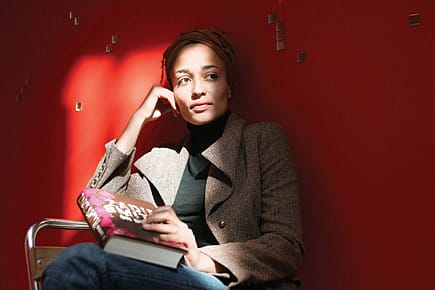Zadie and the Art of the Essay

Funny, relaxed and red blooded, Zadie Smith shows she's much more than just a novelist.
Funny, relaxed and red blooded, Zadie Smith shows she's much more than just a novelist.
Funny, relaxed and red blooded, Zadie Smith shows she's much more than just a novelist.
She erupted in the late 90s with the award-winning novel White Teeth, which established her as one of Britain's brightest young writers. Zadie Smith took the world by storm with her fiction, but she also turns out to be a fine funny critic and commentator.
Changing My Mind: Occasional Essays is a book that, as she says in the foreword, 'was written without my knowledge' based on requests from magazines and other publications. 'Two thousand words about Christmas? About Katherine Hepburn? Kafka? Liberia? A hundred thousand words piled up that way.' The essays spring from Smith's occasional straying from fiction into film reviews, reporting, literary criticism and memoir. She writes in the foreword: 'When you are first published at a young age, your writing grows with you—and in public. Changing My Mind seemed an apt, confessional title to describe this process.' These essays portray a kind of literary workout, a versatile writer flexing a range of literary muscles in a variety of cerebral engagements.
In her essay on Zora Neale Hurston's Their Eyes Were Watching God, she writes, 'I feared my 'extraliterary' feelings for her. I wanted to be an objective aesthete and not a sentimental fool [… ] I wanted to like Hurston because she represented 'good writing', not because she represented me.' At first disturbed by her strongly personal response to Hurston, Smith comes to see its strengths. In EM Forster, Middle Manager she examines the perplexing 'admixture of banality and brilliance' of a writer she calls 'a tricky bugger' for inhabiting a kind of middling spot that seems sometimes 'the most radical place to be' and sometimes just the most comfortable. Forster's novels, she says, 'are full of people who'd think twice before borrowing a Forster novel from the library.'
It's the Pits!
13 Feb 2026 - Vol 04 | Issue 58
The state of Indian cities
Smith is rooted in the classical Anglo-European tradition, but constantly tests intellectual boundaries. Her essay Middlemarch and Everybody is an affectionate examination of the greatness of George Eliot and the 19th century novel, but takes from it the idea that 'Forms, styles, structures—whatever word you prefer—should change like skirt lengths.'
In Rereading Barthes and Nabokov she looks at the Barthian death of the author, and Nabokov's dominating author who 'limits the possibility of the reader's play'. In F Kafka, Everyman she compares Brod and Begley's representations of the man, concluding, 'there is a sense in which Kafka's Jewish question (What have I in common with Jews?) has become everybody's question, Jewishness the template for all our doubts. What is Muslimness? What is femaleness? […] These days we all find our anterior legs flailing before us.'
One of the most wonderful essays here is That Crafty Feeling, one version of a lecture that Smith gave to Columbia University's Writing Program in 2008. In ten short notes she distills the experience of writing a novel, from the difficulties of temperament (micro manager or macro planner?) to revisiting the published work years later. 'It's such a confidence trick, writing a novel. The main person you have to trick into confidence is yourself.'
When she writes about film, Smith plunges, often shamelessly star-struck, into pleasure tempered with wryness. Of her idol Katherine Hepburn, she writes, 'There are certain of her early films where a good 70 per cent of the acting is coming from the nose down, and the average 1930s Depression-era moviegoer was not in the mood to be looked down upon through quite so straight and severe an instrument.' Describing the movie Adam's Rib, she collapses disarmingly with 'Oh, just go out and rent it.'
Among the films reviewed in At the Multiplex her pan of Rob Marshall's Memoirs of a Geisha is gently scathing. 'In Japan, all is tumult: it is raining, the sea is crashing, the camera wobbles. A strange man arrives. Chiyo's father is crying. He weeps for Chiyo and her elder sister, both of whom he has decided to sell to the strange man. He weeps for the 150 pages of the original novel now crowbarred into this four-minute sequence. A panpipe plays its melancholy tune of longing. This pipe was also in Titanic.' Of Date Movie she says, not quite as wryly, 'Date Movie is the worst film I have ever seen. I really mean that. Forty minutes in, I fled the cinema feeling dazed, aggrieved, and strangely weepy, as if a stranger had just physically threatened me.' Her notes from Oscar weekend are a delightfully oblique take on one of the world's most famous events.
She lays out the personal without putting her heart on her sleeve. Of Christmas with her multi-racial family, she says: 'Family represents the reality of which Christmas is the dream.' She writes movingly about her father in Accidental Hero and Dead Man Laughing.
Perhaps the greatest delight and relief to be had from this collection is the discovery that Smith is not of the bone-dry, pedantic school of academic criticism that saps the joy out of literature. She is opinionated without being dogmatic, and writes red-bloodedly, with flair and humour, without oversimplification. She isn't afraid to reconsider her thoughts, change her mind, and put the 'extraliterary' fun back in thinking and writing about thinking and writing. Highly recommended.
